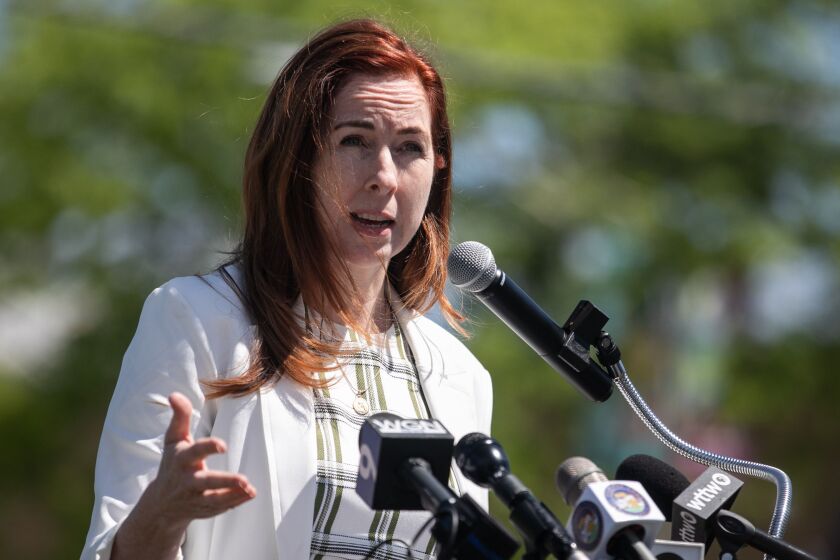A measure sent to the governor would let public agencies take action on vacant homes before they get lost in Cook County’s tax sale process.
Cook County’s property tax system is confusing enough when people pay on time, but when they don’t, there’s a whole new level of bewilderment.
Properties with back taxes go into a knot of tax sales in which investors pay what’s due and then try — or maybe not — to collect the back taxes with interest from the owner. It’s a system for collecting tax revenue owed to local governments, but research has shown it doesn’t do a good job. Nor does it help with what should be a secondary goal of getting problem homes into responsible hands so they are no longer a blight.
The system lets properties languish for years, even decades, as tax buyers play by rules that favor them, often getting their money back with interest not from the original owner but from the county. The arcane system has one inviolable rule, as homebuilder and contractor DaJuan Robinson learned.
“The longer they sit there in the system, the worse their condition,” said Robinson, president of DNA Construction.
In his quest to buy abandoned homes, mostly on the South Side and southern suburbs, rehab and sell them, Robinson partners with the Cook County Land Bank Authority. “The land bank cuts the red tape and eliminates all the liens and back taxes and the water bills,” preparing properties for a private investor, he said.
Robinson worked through the land bank to acquire an abandoned home at 6637 S. Marquette Road, which he turned into a four-bedroom, three-bathroom property listed at $469,000.
He has also worked with the agency to renovate and sell a single-family home at 74th and Calumet Avenue and to build three-flats on vacant lots in the 6300 block of South Langley Avenue. He said the Calumet home yielded an estimated $100,000 profit on a $250,000 investment.
A bill passed by the Illinois General Assembly in May would help community renewal by allowing local governments and agencies they work with, such as the land bank, to file tax liens earlier in the redemption process, Robinson said.
The measure, headed to the governor for final action, would allow counties to act on abandoned or vacant properties after just one failed tax sale. Currently, the land bank has to wait until properties have years’ worth of back taxes and wind up in what’s called the scavenger sale, held every two years.
Cook County Commissioner Bridget Gainer, who chairs the land bank, said homes typically sit vacant for seven to 10 years before her agency can get control. She hopes the legislation, if it becomes law, can cut that time in half.
“The land bank only exists because there are places the private market totally ignores,” she said.
A study by the University of Chicago showed that from 2007 to 2019, only 7% of all properties that landed on the scavenger sale were redeveloped. Tax buyers were not reinvesting in communities.

Since its founding in 2013, the agency has gained title to and arranged for the renovation of more than 1,500 properties.
The Sun-Times has documented cases of questionable deals by the land bank, and a former employee has pleaded guilty to scamming the agency for his personal gain. Gainer said staffing changes and clearer guidelines about which properties to pursue were implemented to improve operations.
The legislation deals with another matter that has kept problem properties from being redeveloped. It’s a little game called “sale in error.” Tax buyers for any reason, however trivial, can cancel an approved tax sale and get repaid with interest by the county.
A study by the Cook County treasurer’s office found that over a seven-year period through 2022, tax buyers recouped more than $277 million that would ordinarily go to local governments. Most of the money was siphoned from Black or Latino communities, according to the study.
Hedge funds, private equity investors and others exploited the “sale in error” loophole by citing minor mistakes in a property’s description, such as a home having brick instead of stucco. The legislation would bar such workarounds. One provision would ensure the tax buyer can’t claim a grease trap is an environmental hazard.
The bill also lowers the interest rate delinquent property owners must pay. It would fall to 0.75% per month from 1.5% per month. The legislation, which had the support of downstate cities, was a cooperative effort that included The Chicago Community Trust and Cook County Treasurer Maria Pappas. Its passage came after around eight years of lobbying.
Pappas said more measures are needed to reform the tax buying system and deal with about 30,000 properties moldering on the scavenger sale list. She’s turned her office into a think tank whose research powered the push for this year’s legislation.
Source: Sun Times











